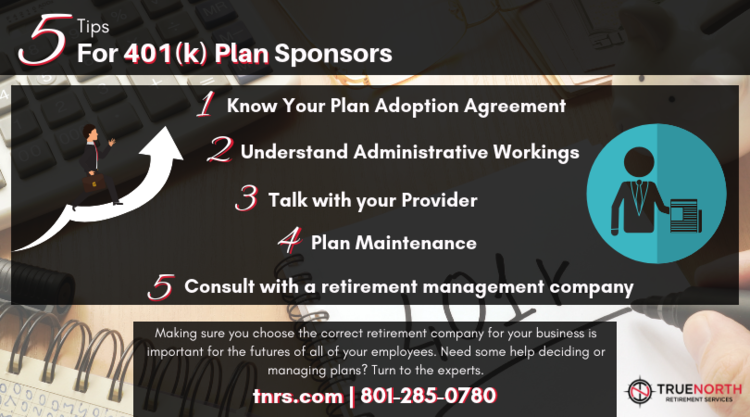
If you offer your employees a 401k plan, then, as the employer (i.e., the plan sponsor), you are ultimately responsible for keeping the plan in compliance at all times. This is true whether you set up and run the 401k yourself, or if somebody else does it for you – at the end of the day, the plan sponsor is the responsible party.
Thus, we’d like to post a few tips for Plan Sponsors straight from the IRS (note: if you have questions, there’s a link to the IRS website at the end. Also, TrueNorth Retirement Services can help clients navigate this as well.)
Know Your Plan Adoption Agreement
This is the who / what / how / etc. document. Your adoption agreement lists the features that can be selected for the plan, which then becomes part of your plan. It covers the “big picture” plan basics, such as:
- Timeframes, like when employees are eligible to participate, and when they become vested.
- Amounts and types of contributions for both employees and employers.
- How employer contributions are divided.
- When and how benefits are paid.
Essentially, this is the plan’s framework and forward-facing aspects (for example, when a company tells a new hire “we have a 401k that matches 4% and you become vested after x years”, they are generally giving information covered in the Plan Adoption Agreement).
So yes, it’s important to make sure that the plan is always following what the Adoption Agreement laid out.
Understand the Administrative Workings
Your plan should have a service agreement that spells out the administrative details. It may or may not include specific names and/or departments. However, you should ensure that all of the following are covered:
- Be aware of law changes and update the plan accordingly.
- Ensure that the participation, contribution, and distribution rules and guidelines are followed.
- Maintain records, and ensure participants get all required plan notices.
- All clerical and form-filing are made correctly, and to the proper recipients (e.g., the IRS, Department of Labor, etc.)
- Are fund investing and fees happening as they should? In a Fiduciary manner?
Also, what happens in regards to oversight – who will bring the plan back into compliance if any of the above are not met? This should be clearly spelled out.
Communicate with the Provider
Talk to your plan provider. Tell them of any changes on your end (your business, your employees, etc.), and make them aware of any changes you’d like to see in the plan. You can also go over all participants, changes in personnel, make sure deductions are accurate, exactly who qualifies as a “highly compensated employee,” and other details.
This is also a good time to make sure all fees are understood entirely, and that all hardship/loan/withdrawal provisions are in place.
Having an ongoing dialog, with regularly scheduled 401k plan checkups, will help ensure the plan runs smoothly, and that any roadblocks in the checks and balances are identified and overcome.
Plan Maintenance
Essentially, this is a culmination of everything mentioned above. There should be a process in which the plan is maintained, and all changes/issues recorded and handled by the appropriate party.
For example, all reports should be reviewed and checked for accuracy. This includes the allocation and distribution reports, which will verify both consent and participation by employees. In addition, all loans and repayments should be monitored, and everything documented. Even defaulted/late repayments need to be recorded.
A detailed action plan for these events is very desirable. Having a predictive process for reviewing reports as they are released is always a good idea.
In Summary
Indeed, there are a good amount of moving parts and regulations to a 401k plan, but with proper planning, good recordkeeping, and a timely review schedule, the paper-tiger aspects of a 401k plan need not be daunting.
Here is a link to the IRS website that goes a little deeper into the above. It also has other links to various resources and information. We recommend you bookmark and read it.
https://www.irs.gov/retirement-plans/plan-sponsor/a-plan-sponsors-responsibilities
Lastly, the IRS recommends all companies have an independent review of their plan by a retirement plan company in Salt Lake County. We concur – this is a good idea, and it can help ensure that no stone is left unturned.
If you have any questions about 401k plans, retirement plan services, or anything else, feel free to call TrueNorth Retirement Services at (801) 274-1768 or visit us online at https://www.truenorthwealth.com







